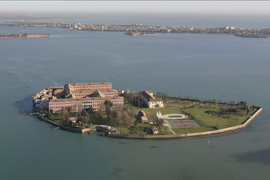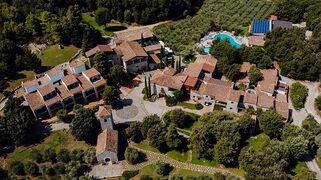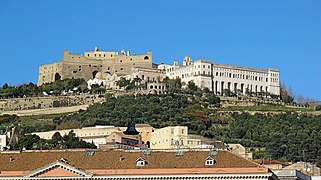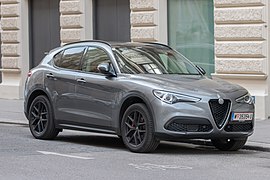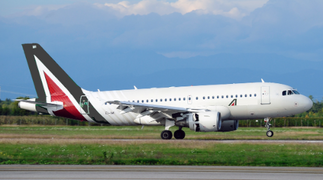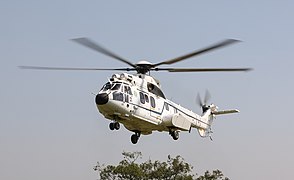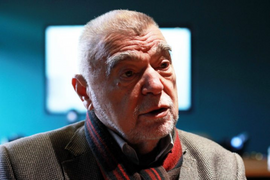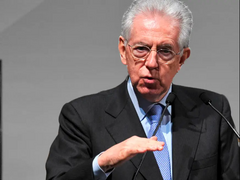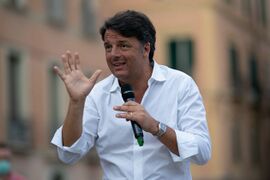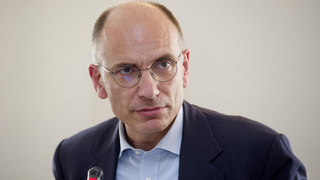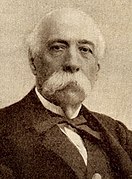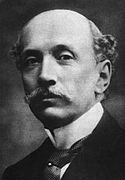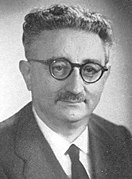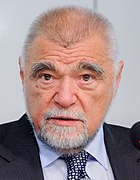President of Etruria
| President of the United Etrurian Federation of Etruria | |
|---|---|
| Presidente della Federazione Etruriana Unita (Vespasian) Predsjednik Ujedinjene Etrurijanske Federacije (Novalian) Predsednik Združene Etrurijanske Federacije (Carinthian) | |
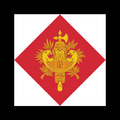 Standard of the President | |
| Style | His/Her Excellency Mr/Mrs. President |
| Residence | Palazzo Orsini, Povelia Cittadella dell'Arcangelo, Solaria |
| Appointer | Popular Assembly of the Federation |
| Term length | five years, renewable |
| Constituting instrument | Constitution |
| Precursor | Chief of State |
| Formation | Affirmation of Republic 29 November 1899 |
| First holder | Alfredo Di Rienzo |
| Salary | ₣1,434,672.72 (€320,000) per annum |
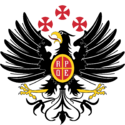 |
|---|
| This article is part of a series on the politics and government of Etruria |
|
|
The President of Etruria, officially the President of the United Etrurian Federation (Vespasian: Presidente della Federazione Etruriana Unita; Novalian: Predsjednik Ujedinjene Etrurijanske Federacije; Carinthian: Predsednik Združene Etrurijanske Federacije), is the head of state, head of government of Etruria and the commander-in-chief of the Etrurian Defence Force (EDF) under the Constitution of Etruria. The President was the head of state from 1899-1938, when the Premier served as head of government, between 1938 and 1946, Etruria had two co-serving heads of state, known officially as Co-Leaders. President return for the period of 1948-1960, before being replaced by the Chief of State and has been in place since 1984.
The president of Etruria is elected by the Popular Assembly, the lower-house of the Senate, and is usually the leader of the largest party or coalition. Since 2016, this has been the Tribune Movement. The president of Etruria serves for five year terms which are renewable without limit. The inaugural holder of the office of President was Alfredo di Rienzo and the inaugral holder of the office under the current constitution was Miloš Vidović, who served as president following the restoration of democracy in 1984 in wake of a twenty four-years of military rule. The incumbent is Francesco Carcaterra, who was elected by the Popular Assembly on 11 August 2016, as leader of the largest party as result of the 2016 federal election.
The president is required to be a member of the Popular Assembly at the time of his or her election. Following their election, the president retains their seat, though may appoint a Chief Constituent Secretaty to manage the day-to-day affairs of their constituency. The president may be removed either by a motion of no-confidence or an impeachment trial.
History
Despite the San Sepulchro Revolution of 1888 bringing about the Etrurian Second Republic and a democratic system, for its first eleven years, the Second Republic was led by the Chief of State, held by Romolo Alessandri, a Solarian Catholic archbishop and cardinal. He was supported by the Premier, who served as head of government. In Alessandri’s later years, he announced plans for elections to be held in wake of his death to elect a President directly. His death in 1899 was followed by the election Alfredo di Rienzo, as the inaugural president of the Etrurian republic. The president of the Second Republic operated under a semi-presidential system. Marco Antonio Ercolani would be the last serving president of the Second Republic, being overthrown in the Legionary Reaction in 1938.
The office of president would return in 1948, with the Etrurian Third Republic, though this position was the first to introduce the current system of the office being held accountable directly to the federal legislature. Giuseppe Zappella was the inaugural holder of the Third Republic, however, structural weaknesses in Etruria’s governing system would produce successively weak governments, with presidents on average serving tenures of just two-years. The Western Emergency, chronic corruption and economic stagnation would lead to Massimo Bartolucci being overthrown in the bloodless coup d’état of 1960. From 1960 until 1984, the military government would be headed by a Chief of State.
In 1984 and the restoration of democracy through the current Fourth Republic, the office president was once again resurrected under the system of the Third Republic, though with a significantly reinforced parliamentary system. The first post-dictatorship president was Miloš Vidović, who served for a single five-year term before becoming Secretary-General of the Community of Nations.
Electoral system
Etruria maintains a distinct system for the election of the president. Unlike other parliamentary systems, where the president is nominally the head of state, the president of Etruria is both head of state and head of government, as well as the commander-in-chief of the Etrurian Defence Force. Also distinct from presidential or semi-presidential systems elsewhere, the president of Etruria is elected by the Senate of the Federation, rather than through popular direct elections. According to Etrurian constitutional theory, the President is answerable to the people through the federal legislature, while also being able to influence and manage legislation as head of the largest party or group of parties.
The President of Etruria is elected by the Popular Assembly, in the first sitting in wake of an election, and whenever a vacancy arises. The president is elected by the Popular Assembly by simple majority and must be a member of the lower house to be eligible. The election is overseen by the President of the Senate, the overseer of parliamentary protocol. The president must then be sworn in immediately after the vote, taking the presidential oath before a joint session of the Senate. The candidate for president is by convention the leader of the largest party or coalition, though parties may propose any of their elected members as president. Should a vacancy arise, the constitution states that the date of a new election must be set by the President of the Senate, but not more than 30 days after the vacancy occurs. By tradition and convention, the Deputy President is subject to a confirmation election within a day or two days of a vacancy arising.
Although the presidency is the principal institution within Etruria’s political system, it is constrained by numerous checks and balances that prevent the accumulation of total power over government. The president serves five-year terms, with no limits to the number of terms consecutively served. However, no one individual may hold the office of president more than once.
Succession
According to the Etrurian constitution, in the event that the President is incapacitated, removed from office or unable to execute the powers of the presidency, the Deputy President will assume the powers afforded to the office. Should both be removed from the line of succession, a federal cabinet minister selected by the President at a prior date (usually the day of his or her election by the Senate), should that minister be removed, the President of the Senate will assume the powers of the presidency.
Whomever assumes the office of the president does so on an interim basis, until an election is held for the Popular Assembly to formally elect a president.
Removal from office
According to the Etrurian constitution, a sitting president can be removed by impeachment, a no-confidence vote or a leadership challenge by a member of their party or coalition.
For a sitting president to be successfully impeached by the Senate, a simple majority is needed to pass a Motion of Removal in the Popular Assembly. From the Motions tabling to the vote, the Popular Assembly will be presented with evidence and just cause for a yes vote. Should the Popular Assembly vote for the motion, the Federal Assembly, the upper-house will then study the case presented by the lower-house in relation to the constitution’s prescribed charges to allow impeachment, a two-third majority vote is needed to remove a president.
A motion of no-confidence can be tabled by any member of the Popular Assembly and simple majority is needed to pass the motion. The constitution, however, does not explicitly state that a sitting president is removed in wake of a motion of no-confidence, stating that it is the “discretion of the sitting president to act upon the motion.”
A president may be removed from office by a member of their party or coalition through a leadership challenge. For this to succeed, the party or coalition must vote for the challenger and secure an election in the Popular Assembly from the President of the Senate, to have the winner of the party-coalition vote be confirmed as president.
Constitutional powers
The president of Etruria as head of state, government and commander-in-chief has the rights, responsibilities and remuneration stated in Article IV of the constitution, and subsequent amendments and laws passed by the Senate of Etruria. The executive powers of the federal government are vested in the president. The first duty of a newly elected president is to appoint members of the Senate to form his or her Federal Cabinet. Cabinet appointments do not require confirmation votes by the upper house. Through the cabinet, the president implements and enforces the constitution, laws of the federation, and implements his or her political agenda. The president also appoints various officials to positions stated within the constitution. The most important, besides the cabinet are justices of the Supreme Constitutional Court, the Supreme Court of Cassation and federal circuit judges. Judges are appointed on the advice of the Judicial Appointments Council. The President also appoints ambassadors, agency heads and notably confirms the Prefects of each state following their election by state legislatures, though this is a tradition and holds no legal meaning or consequence.
As a sitting member of the Popular Assembly, the president plays a major role in the formation of legislation by government. He/she signs bills into law and holds the power of veto (though subject to an override), refers bills back to the Senate or to the Constitutional Court. The president may call a referendum and dismiss the Senate to spark a general election. Every three-years to mark the mid-point of their five-year term, the President summons a joint session of the Senate to deliver remarks on objectives and the agenda for the remainder of the term in the State of the Federation address.
As the president is the commander-in-chief of the Etrurian Defence Force therefore possessing influence or control over foreign and security policy. The president may declare a state of emergency or martial law with a simple majority vote of the Popular Assembly. He or she is afforded the constitutional powers to declare war and peace, negotiate and sign (although not ratify – this is the duty of the Federal Assembly) treaties, receives and appoints diplomatic officials, confers honours, and grants pardons.
Compensation and privileges of office
As of 2020, the president receives a monthly salary of ₣119,556.06 (€26,666), along with an undisclosed expense account to cover travel, goods and services while in office, which is subject to annual review by the Ministry of Finance. The president is exempt from paying various taxes including income and property for the duration of their presidency. The president and his/her immediate family members are provided with personal protection, organised by the State Protection Service.
The Isola di San Pietro is the official office and residence of the President; he or she is entitled to use its staff and facilities. The president is also afforded the Cittadella dell'Arcangelo in Solaria as an alternative residence and workplace, though until Francesco Carcaterra, this was rarely used. The president may also use the Casa della Contemplazione, a large villa located outside of Tyrrenhus, as a country retreat.
For ground travel, the president uses the presidential state car, which is an armored version of the Fammotra Centuauro. For air travel, the president has use of a modified version of the Euclobus A319, which transports the president on all medium and long-range international flights. Two modified Candreva 101 jets, are used for short and medium range presidential travel. Three modified military versions of the Euclocopter Super Raven, are currently used as the main presidential helicopters, as well as for the First Spouse and Deputy President.
The president of Etruria is granted the use of specific styles of office, Francesco Carcaterra as president is refered as follows: Il Più Eccellente Senatore e Presidente della Federazione ("The Most Excellent Senator and President of the Federation"), Vostra Eccellenza ("Your Excellency") and Signor Presidente or Presidente ("Mr. President" or "President")
- Presidential Amenities
Post-presidency
The following privileges are guaranteed to former presidents by law:
- Permanent security protection (by the State Protection Service - Servizio di Protezione dello Stato)
- The use of two official vehicles (for life) - one for ground travel and another for air.
- Repository funding for a presidential library or institution.
- Lifelong pension paid per annum: (₣448,335.23; €100,000) for presidents who served between 0-5 years; (₣896,670.45; €200,000) for presidents who served between 5-10 years; (₣1,345,005.68; €300,000) for presidents who served over 10 years.
- Lifelong pension to paid onto widow and children.
List of living former presidents
- Living former presidents
Vinko Begović,
served 2002-2009
19 November 1935Urbano Onoforio,
served 2009-2011
24 April 1940Emiliano Reali,
served 2011-2016
18 March 1974Andrea Salvini,
served 2016
24 December 1965
Office holders
Etrurian Second Republic
- Presidents of the Second Republic
Etrurian Third Republic
- Presidents of the Third Republic
- Aldo Moro in 1965.jpg
Etrurian Fourth Republic
- Presidents of the Fourth Republic


